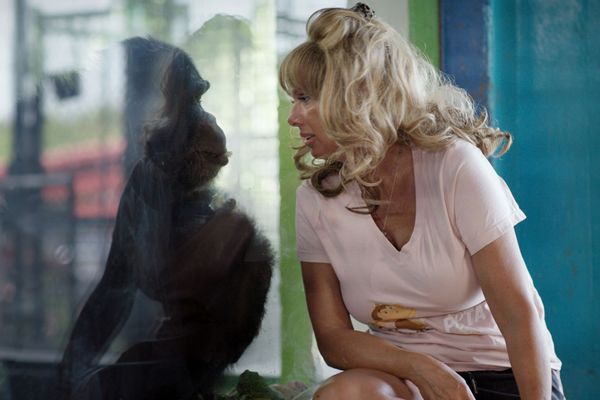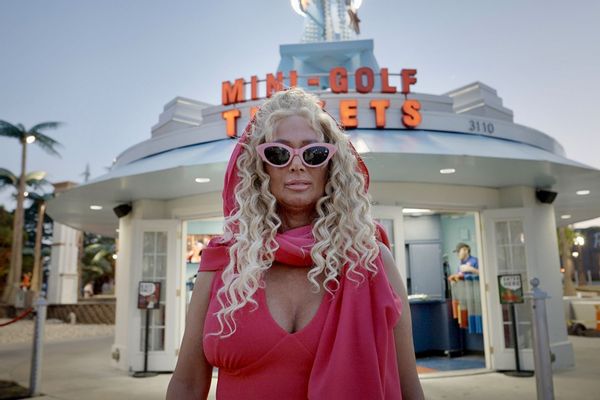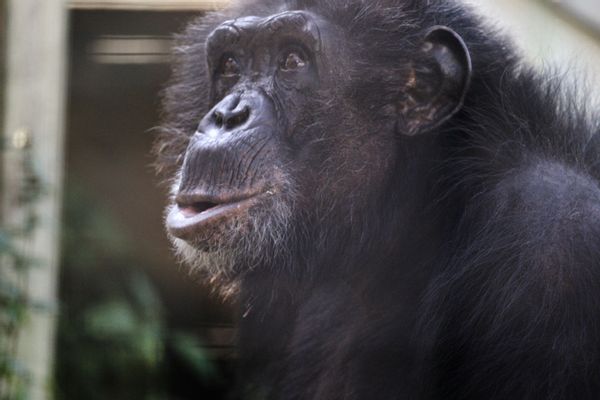
“Things are getting kind of strange” is what you’d expect someone in a docuseries called “Chimp Crazy” to say. By the time someone drops that line, Tonia Haddix has already recalibrated our bar for strangeness.
The four-part series opens with Haddix in what looks like a child’s nursery, with stuffed animals and bunk beds. As she presses her nose to the face of a diapered baby animal she says, “Monkey love is totally different than the way that you have love for your child,” going on to explain that the bond is much deeper.
Haddix’s son, introduced later, has come to accept his lower place in his mother’s emotional hierarchy, and her husband appears to do the same. Haddix’s heart is ruled by Tonka, a 32-year-old chimpanzee who appeared in several Hollywood movies, including 1997’s “Buddy” and 1998’s “Babe: Pig in the City.”
Haddix thinks of all her primates as her kids. She feeds them McDonald’s Happy Meals and Gatorade through the doors of their cages. What she views as playful antics look like stressed-out apes bouncing off their steel mesh walls.
Out of all of them, Tonka is special. “Tonka always makes me feel safe,” Haddix says, later adding, “He’s just a very kind and loving person.”

We’ve also watched Haddix spill her secrets to a former circus clown claiming to be making a documentary about her legal plight, but who isn’t really directing it.
Eric Goode, the filmmaker who gave us 2020’s “Tiger King,” is behind “Chimp Crazy.” Although he’s been documenting exotic animal keepers for many years, his “Tiger King” notoriety also made it difficult, if not impossible, to approach exotic animal brokers like Haddix head-on.
Instead he sent “proxy director” Dwayne Cunningham to interview her and capture other footage using hidden cameras, including a game-changing turn HBO has deemed a spoiler.
Like other docuseries with a knack for being in the right place at the right time, Goode and Cunningham are deeply insinuated in Haddix’s life as the situation evolves from garden-variety chimps in cowboy hats “strange” to “taking a kidnapping turn.” The culmination is funny but troubling; enraging at times but also somewhat empathetic to both the apes and the people loving them to death.
A story this bizarre didn't escape the national media’s notice. (If you simply can't wait for four weeks to see how it turns out, plug Haddix’s name into a search engine or click the above link.) But “Chimp Crazy” is less fascinating for the story’s outcome than its insight into the types of people who are obsessed with chimps regardless of the dangers they pose.
Haddix’s fixation with Tonka is the series spine, but Goode uses each development in her odd case to look at other stories of housebound chimps that turned on humans. There's Travis who in 2009 mauled his owner's friend so severely that it left her blind and with a featureless face. (His story inspired the Gordy subplot in Jordan Peele's "Nope.") Or Buck, the chimp shot dead by police after mauling his owner’s adult daughter in 2021.
Without explicitly saying so, Goode reveals in Haddix and others a breed of human drawn by a dark neediness to these animals that nature designed to grow beyond their control.
Originally Goode sought to interview Connie Casey, a breeder the series says is responsible for three-quarters of the captive-bred chimpanzees in the United States. Casey rented out chimps for events or to model for Hallmark cards through her for-profit company called Chimparty.
She later rebranded it to Missouri Primate Foundation and made it a non-profit, but it remained a chimp mill until a friend of Casey’s reached out to PETA. Casey refused to work with the filmmakers but Haddix, who volunteered at the facility, happily spoke on Casey’s behalf. Eventually she took custody of the chimps to try to nullify the PETA’s lawsuit, but they simply added her name to it.
Once Cumming learned his beloved co-star had not retired to Palm Springs, as he was told, but was being kept in a filthy cage in Missouri, he fortified PETA's efforts by lending his celebrity to the cause. The organization was nearly successful at relocating all the chimps to a well-managed sanctuary. But when the authorities came to seize them, Tonka was missing. Haddix told them he died suddenly. PETA's lawyers don’t believe her.

Unlike Joe Exotic’s trashy lewdness, however, Haddix’s personality is simultaneously maternal and juvenile. She defends her right to keep chimps by calling Tonka a “humanzee,” half human, half chimpanzee, and therefore happier with her than other primates. Other reasons she gives for loving chimpanzees, however, say more about her deep-seated needs than theirs.
“They don’t break your heart,” she says. “They don’t grow up and get a mind of their own.” “They’ll be your friend for life.”
Haddix was made to star in a docuseries. She's easily flattened into a heavily painted cartoon with eyelash extensions and clacking acrylic nails. There’s very little she says in “Chimp Crazy” to the lawyers and judges hounding that’s true, but the biggest whoppers she tells highlight her self-delusion. She and other chimp owners insist the animals are better off with them even though reasonable people can see they're imprisoned in miserable cages.
But she’s also the type of person whose extremity and selfishness make it easy for the audience to overlook the filmmaker’s ethically questionable choices, beginning with having Cunningham stand in for him. (A Rolling Stone story about Haddix’s case also implies that Cunningham and the other crewmembers didn’t reveal to her who was funding the film, which might have impacted her willingness to participate.)
Of course, this resumes the argument over whether this style of nonfiction filmmaking should be held to what are understood to be common editorial standards and practices. "Chimp Crazy" is constructed as entertainment, with a soundtrack and framing choices that accentuate the absurd comedy of this situation alongside the tragedy.

Does it serve the audience’s understanding of the difference between filmmakers like Goode and journalistic documentarians? Hard to say. “But we like to look at ourselves differently, don’t we?” Goode muses late in the story. “I don’t know . . . we like to believe our own truth.”
Exactly. It’s much simpler to persuade the audience to glom onto the spectacle of Haddix’s poor choices and forgive whatever murky choices Goode and his team make to thwart it. Nothing strange about that at all.
"Chimp Crazy" begins airing Sunday, Aug. 18 at 9:45 p.m. ET on HBO, across four weeks.







